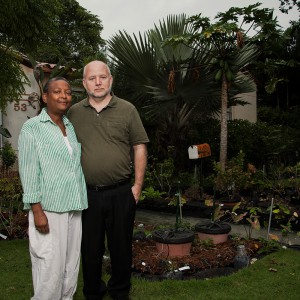Florida City Tells Couple They Can’t Keep Their 17-Year-Old Vegetable Garden

PHOTO COURTESY INSTITUTE FOR JUSTICE
Hermine Ricketts and Tom Carroll grew food for their personal consumption in their front yard.
A Florida couple who had cultivated a small garden for nearly two decades at their Miami Shores home was given an ultimatum earlier this year by the city’s zoning code enforcement officer: Dig up your garden or pay $50 a day to the city for violating a new ordinance.
After spending months attempting to obtain an exemption from the city that would have allowed them to continue tending a modest plot of vegetables at their home (just as they’d done for the past 17 years), Tom Carroll and his wife, Hermine Ricketts, dug up their garden.
Miami Shores had instituted a new zoning ordinance in May outlawing vegetables (but not, as watchdog.org notes, fruit, trees or plastic flamingoes) in the front yards of local homes.
That measure was followed by a visit to the couple’s home courtesy of the zoning department, which told the homeowners they would have to comply or pay a never-ending fine.
After Carroll and Ricketts capitulated, the Institute for Justice — a civil liberties nonprofit organization staffed by lawyers — stepped in, filing a lawsuit that seeks to have the discriminatory ordinance declared unConstitutional. The organization alleges the code infringes on the couple’s privacy, and that the ordinance exemplifies a growing nationwide trend that pits government against small-scale food growers.
“For 17 years, Hermine Ricketts and her husband Tom Carroll used their front yard to grow food for their own personal consumption,” IJ said in announcing the lawsuit. “And for 17 years, nobody had a problem with it . . . until now.”
Hermine and Tom are part of a nationwide movement of small-scale food producers and consumers who are tired of the government dictating what foods they can grow, sell, and eat. On November 19, 2013, they joined with the Institute for Justice to challenge Miami Shores’ senseless front-yard vegetable garden ban. Their case aims to vindicate the right of all Americans to peacefully use their own property to support their own families.
Despite the fact that Carroll and Rickets are stable, longtime residents whose position in the neighborhood has remained stable and benign over many years, the ordinance did not include language to grandfather in properties like theirs. The law’s intent, as written, is to “protect the distinctive character of the Miami Shores Village.”
The Institute for Justice has some good background information on the couple’s case, including its significance in the wider context of similar legislation throughout the country that takes direct aim at property owners who produce and consume their own food.
“Because Hermine and Tom’s right to grow vegetables on their own property for their own consumption is protected by the Basic Rights and Right of Privacy Clauses of the Florida Constitution, courts are required to apply heightened scrutiny in reviewing Miami Shores’ ban on front-yard vegetable gardens,” IJ maintains. “That means Miami Shores will have to prove that its ban promotes a compelling governmental interest and is narrowly tailored to advance that interest. If the government does not meet that high burden (and it cannot), the ban must be struck down as unconstitutional.”
To see more photos of the couple and their property, check out IJ’s related media page
No comments:
Post a Comment
Thanks for commenting. Your comments are needed for helping to improve the discussion.